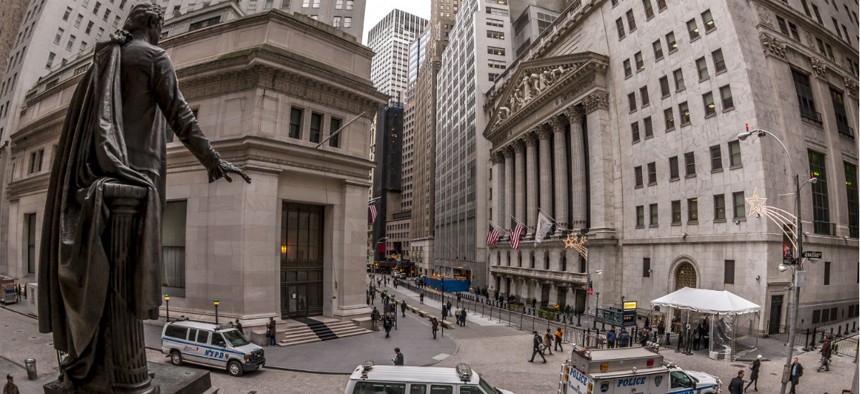
The New York financial district. Marcio Jose Bastos Silva/Shutterstock.com
Stock Market Jitters Underline Vacancies in Financial Agencies
Senate faces a long list of unconfirmed nominations for regulators, deputies, judges.
When the Senate resumes work after Labor Day, members will face a growing backlog of presidential nominations awaiting action, with one batch gaining new urgency after the gyrations of world stock markets.
A Government Executive round-up of nomination-tracking sources shows six top-level vacancies at financial players such as the Federal Reserve, the Securities and Exchange Commission, the Federal Deposit Insurance Corp. and the Commodity Futures Trading Commission.
Senate committees and floor leaders are also looking at some 230 major nominations for agency heads, cabinet deputies, ambassadors, board members and judges. According to the White House website, a governmentwide total of 1,538 nominations for high and mid-level positions await action. If not taken up by the Senate, their prospects would appear to diminish in election year 2016 with President Obama’s administration nearing its end.
“The market volatility experienced around the world this week should remind us how important it is to have a full slate of regulators in place at financial regulatory agencies,” said Justin Schardin, associate director for financial reform at the nonprofit Bipartisan Policy Center, which tracks nominations to financial and energy-related agencies. “With the president in the final months of his term, time is running out for him to fill vacancies that are or will soon be open on the Federal Reserve, the FDIC, the SEC, and the CFTC, while the Senate has two nominations to the Federal Reserve to consider after the August recess.”
Obama has yet to nominate a replacement at the CFTC for Scott O’Malia, who left Aug. 8, 2014, and CFTC Commissioner Mark Wetjen just announced that he is leaving Aug. 28, reducing the five-seat commission to three. Other financial vacancies include that of a director of the FDIC, the Federal Reserve’s vice chair of supervision, and two directors of the National Credit Union Administration. Two SEC commissioners, the Wall Street Journal reported, plan to step down this fall.
Among ambassadors, there are 33 nominees awaiting action, according to an Aug. 6 tally by the American Foreign Service Association. Seven have been approved by the Senate Foreign Relations Committee, 11 more have had their hearing, and 15 have had no hearing. Several have been waiting more than a year, among them John Estrada for ambassador to Trinidad and Tobago (716 days); Cassandra Butts for ambassador to the Bahamas (542 days); and Mari Carmen Aponte as ambassador to the Organization of American States (371 days).
Jennifer Ann Haverkamp has been waiting 326 days for a vote on her nomination to become assistant secretary of State for Oceans and International Environmental and Scientific Affairs. A would-be agency head awaiting Senate action is Gayle Smith to be administrator of the United States Agency for International Development.
A tally on the Senate website shows some 121 non-military subcabinet, ambassadorial and board nominees still awaiting committee action, plus about 49 cleared by committee and awaiting a floor vote. The Senate notes that “no executive nominations have been returned to the president or disapproved by the Senate during the current Congress.” But the list of nominations withdrawn in 2015 stretches to nine, among them Earl Gay to be deputy director of the Office of Personnel Management; Ericka Miller to be assistant Education secretary for postsecondary education; and Juan Garcia III to be an assistant secretary of Defense.
The most common source of friction in the Senate confirmation process are federal judicial nominations, whose vacancies currently number 33, according to Judicialnominations.org.
Senate Minority Leader Harry Reid, D-Nev., in May took to the floor to blast the Republican leadership for blocking judicial nominations, saying, “So far this year the Senate has confirmed two judicial nominees. Just two. By contrast, in 2007 – my first year as majority leader during the Bush Administration – the Senate confirmed 16 judicial nominees. If the Republican majority keeps up their current trend of ignoring judicial nominees, the Senate will confirm five judicial nominees in all of 2015,” Reid said. “The last time the Senate confirmed so few presidential judicial nominees was, unsurprisingly, the Republican majority at the end of the Clinton Administration. It’s funny how history repeats itself.”
But Judiciary Committee Chairman Chuck Grassley, R-Iowa, views the record differently. He told a May hearing that last November and December, “the Democrats, without regard for Senate history or practice, rammed through 11 federal judges during the lame duck [session], who, under regular order, should have been considered this Congress, just like was done in 2007. Had the historical practice been followed,” Grassley said, “we’d have about the same number of confirmations by now. Overall, the Senate has confirmed 309 of President Obama’s judicial nominees. At the same point in his presidency, President Bush only had 274 judicial nominees confirmed.”
The Bipartisan Policy Center’s research has found that “the nominations process for independent financial regulators has taken much longer under President Obama than under President George W. Bush,” Schardin told Government Executive. “Both President Obama and the Senate have contributed to these delays. It has taken an average of 249 days for President Obama to decide on independent financial regulatory nominations compared to an average of 182 days for President Bush. It has also taken the Senate an average of 191 days to act on President Obama’s nominations, compared to an average of 98 days under President Bush.”
(Image via Marcio Jose Bastos Silva/Shutterstock.com)







